

Www.greekmyths-greekmythology. Www.ancient-origins. Daedalus. Daedalus was an Athenian architect, and the first inventor of images.
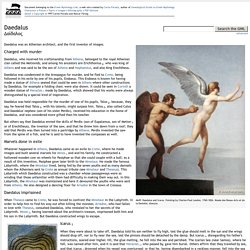
Charged with murder. Www.ancient. Daedalus is a figure from Greek mythology famous for his clever inventions and as the architect of the Minotaur’s labyrinth on Crete.

He is also the father of Icarus who flew too close to the sun on his artificial wings and so drowned in the Mediterranean. Www.britannica. Daedalus, (Greek: “Skillfully Wrought”) mythical Greek inventor, architect, and sculptor, who was said to have built, among other things, the paradigmatic Labyrinth for King Minos of Crete.

Ancient sources for the legends of Daedalus give varying accounts of his parentage. It is reported that in a fit of envy he murdered his talented nephew and apprentice—named Perdix by some and Talos by Apollodorus—who is said to have created both the first compass (the type used in drafting) and the first saw. Daedalus is said to have thrown the boy from the Acropolis, for which act he was banished from Athens. Arriving in Crete, where his creative reputation preceded him, Daedalus was welcomed at the court of Minos and his wife, Pasiphae, and he quickly became embroiled in another messy situation. Daedalus.html. Daedalus was a craftsman and artist in Greek mythology, who had two sons, Icarus and Iapyx.
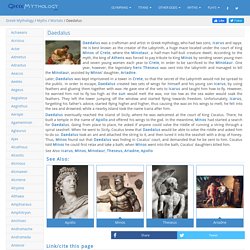
He is best known as the creator of the Labyrinth, a huge maze located under the court of King Minos of Crete, where the Minotaur, a half-man half-bull creature dwelt. According to the myth, the king of Athens was forced to pay tribute to King Minos by sending seven young men and seven young women each year to Crete, in order to be sacrificed to the Minotaur.
Daedalus.html. Www.merriam-webster. Socratic dialogue. A genre of literary prose Socratic dialogue (Ancient Greek: Σωκρατικὸς λόγος) is a genre of literary prose developed in Greece at the turn of the fourth century BC.
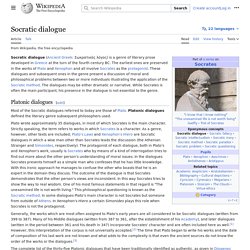
Plato. Plato (/ˈpleɪtoʊ/; Greek: Πλάτων Plátōn "broad"pronounced [plá.tɔːn] in Classical Attic; 428/427 or 424/423 – 348/347 BCE) was a philosopher, as well as mathematician, in Classical Greece.
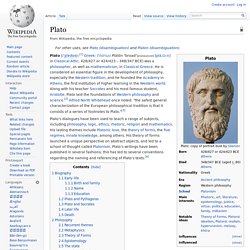
He is considered an essential figure in the development of philosophy, especially the Western tradition, and he founded the Academy in Athens, the first institution of higher learning in the Western world. Along with his teacher Socrates and his most famous student, Aristotle, Plato laid the foundations of Western philosophy and science.[2] Alfred North Whitehead once noted: "the safest general characterization of the European philosophical tradition is that it consists of a series of footnotes to Plato. " Plato's dialogues have been used to teach a range of subjects, including philosophy, logic, ethics, rhetoric, religion and mathematics. His lasting themes include Platonic love, the theory of forms, the five regimes, innate knowledge, among others.
Biography. Justice. Concept of moral fairness and administration of the law Harmony[edit] In his dialogue Republic, Plato uses Socrates to argue for justice that covers both the just person and the just City State.
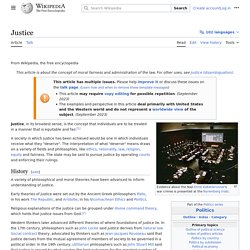
City-state. Independent or autonomous entity whose territory consists of a city A city-state is a sovereign state, also described as a type of small independent country, that usually consists of a single city and its dependent territories.

Historically, this included cities such as Rome, Athens, Carthage,[1] and the Italian city-states during the Renaissance. As of 2019[update], only a handful of sovereign city-states exist, with some disagreement as to which are city-states. A great deal of consensus exists that the term properly applies currently to Monaco, Singapore, and Vatican City. City states are also sometimes called microstates which however also includes other configurations of very small countries, not to be confused with micronations. Several non-sovereign cities enjoy a high degree of autonomy, and are sometimes considered city-states. Historical background[edit] Philosophy. Philosophy is the study of general and fundamental problems, such as those connected with reality, existence, knowledge, values, reason, mind, and language.[1][2] Philosophy is distinguished from other ways of addressing such problems by its critical, generally systematic approach and its reliance on rational argument.[3] In more casual speech, by extension, "philosophy" can refer to "the most basic beliefs, concepts, and attitudes of an individual or group".[4] The word "philosophy" comes from the Ancient Greek φιλοσοφία (philosophia), which literally means "love of wisdom".[5][6][7] The introduction of the terms "philosopher" and "philosophy" has been ascribed to the Greek thinker Pythagoras.[8] Areas of inquiry Philosophy is divided into many sub-fields.

These include epistemology, logic, metaphysics, ethics, and aesthetics.[9][10] Some of the major areas of study are considered individually below. Epistemology. Political philosophy. Socrates. Socrates (/ˈsɒkrətiːz/;[2] Greek: Σωκράτης [sɔːkrátɛːs], Sōkrátēs; 470/469 – 399 BC)[1] was a classical Greek (Athenian) philosopher credited as one of the founders of Western philosophy.
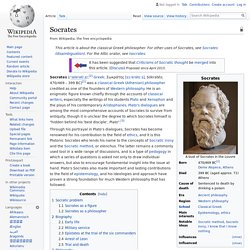
He is an enigmatic figure known chiefly through the accounts of classical writers, especially the writings of his students Plato and Xenophon and the plays of his contemporary Aristophanes. Plato's dialogues are among the most comprehensive accounts of Socrates to survive from antiquity, though it is unclear the degree to which Socrates himself is "hidden behind his 'best disciple', Plato".[3] Philosopher king. King who rules through love and knowledge, as described by Plato In Book VI of The Republic[edit] Plato defined a philosopher firstly as its eponymous occupation: "wisdom-lover. " He then distinguishes between one who loves true knowledge (as opposed to mere experience or education) by saying that the philosopher is the only person who has access to ideas – the archetypal entities that exist behind all representations of the form (such as Beauty itself as opposed to any one particular instance of beauty). Theory of forms. The theory of Forms or theory of Ideas[1][2][3] is a philosophical theory, concept, or world-view, attributed to Plato, that the physical world is not as real or true as timeless, absolute, unchangeable ideas.[4] According to this theory, ideas in this sense, often capitalized and translated as "Ideas" or "Forms",[5] are the non-physical essences of all things, of which objects and matter in the physical world are merely imitations.
Plato speaks of these entities only through the characters (primarily Socrates) of his dialogues who sometimes suggest that these Forms are the only objects of study that can provide knowledge. The theory itself is contested from within Plato's dialogues, and it is a general point of controversy in philosophy. Whether the theory represents Plato's own views is held in doubt by modern scholarship.[6] However, the theory is considered a classical solution to the problem of universals. Forms[edit] Etymology[edit] Terminology[edit] Immortality. Eternal life Immortality is eternal life, being exempt from death; unending existence.[2] Some modern species may possess biological immortality.
Certain scientists, futurists, and philosophers have theorized about the immortality of the human body, with some suggesting that human immortality may be achievable in the first few decades of the 21st century. Other advocates believe that life extension is a more achievable goal in the short term, with immortality awaiting further research breakthroughs. The absence of aging would provide humans with biological immortality, but not invulnerability to death by disease or physical trauma; although mind uploading could solve that if it proved possible. Soul. Linguistic aspects[edit] Etymology[edit] Poetry. Society.
Group of individuals involved in persistent social interaction A society is a group of individuals involved in persistent social interaction, or a large social group sharing the same spatial or social territory, typically subject to the same political authority and dominant cultural expectations. Societies are characterized by patterns of relationships (social relations) between individuals who share a distinctive culture and institutions; a given society may be described as the sum total of such relationships among its constituent of members. Peloponnesian War. The Peloponnesian War (431–404 BC) was an ancient Greek war fought by Athens and its empire against the Peloponnesian League led by Sparta. Glaucon. Piraeus. Place in Greece Piraeus has a long recorded history, dating to ancient Greece. Polemarchus. Polemarchus or Polemarch (; Greek: Πολέμαρχος; 5th century – 404 BCE) was an ancient Athenian philosopher from the Piraeus.
Socrates. Cephalus. Cephalus (; Ancient Greek: Κέφαλος Kephalos means "head"[citation needed]) is a name, used both for the hero-figure in Greek mythology and carried as a theophoric name by historical persons. Mythological. Thrasymachus. Aporia. In philosophy, an aporia (Ancient Greek: ᾰ̓πορῐ́ᾱ, romanized: aporíā, lit. Thrasymachus. Aporia. Adeimantus of Collytus. Adeimantus of Collytus. Analogy of the sun. Analogy of the divided line. Allegory of the Cave. Quadrivium. Dialectic.
Allegory of the cave. Timocracy. Oligarchy. Democracy. Tyrant. Aristocracy. Sparta. A History of Western Philosophy. Bertrand Russell. Philosopher. Government. Allegory of the cave. Platonic realism. Law. Myth of Er. F. M. Cornford. Eric Voegelin. Timocracy. Oligarchy. Democracy. Tyrant. Form of the Good. Theory of forms. Polis. Communism. Doxa. Immortality. Soul. Leo Strauss. Glaucon. Cephalus. Adeimantus of Collytus. Allan Bloom.
Myth of Er. Everyman. Gyges of Lydia. Ring of Gyges. Impunity. Justice. Socrates. Noble lie. Cardinal virtues. Philosopher king. Philosopher king. Form of the Good. Timocracy. Oligarchy. Democracy. Tyrant. Φύλακες. Problem of universals. Allegory of the cave. Theory of Forms. Theory of forms. Problem of universals. Analogy of the divided line. Plato's five regimes. Timocracy. Oligarchy. Democracy. Demagogue. Tyrant.